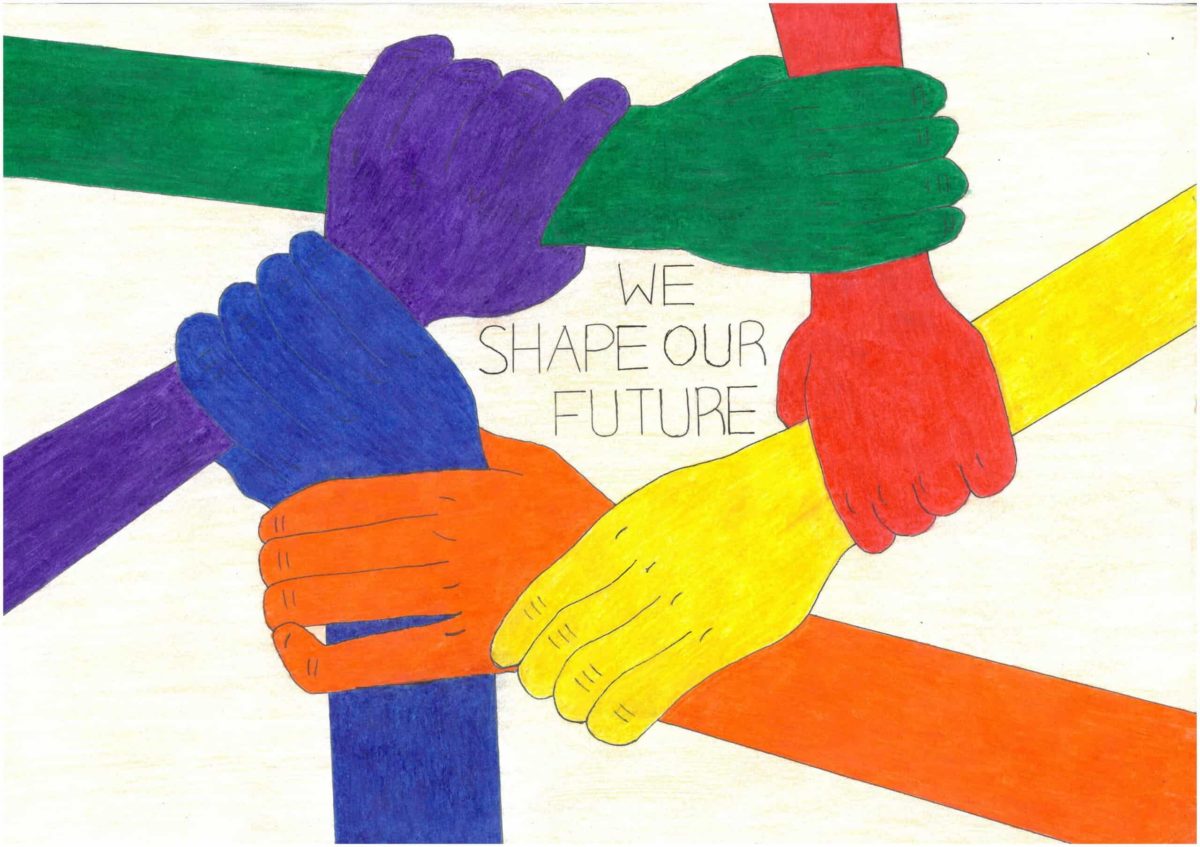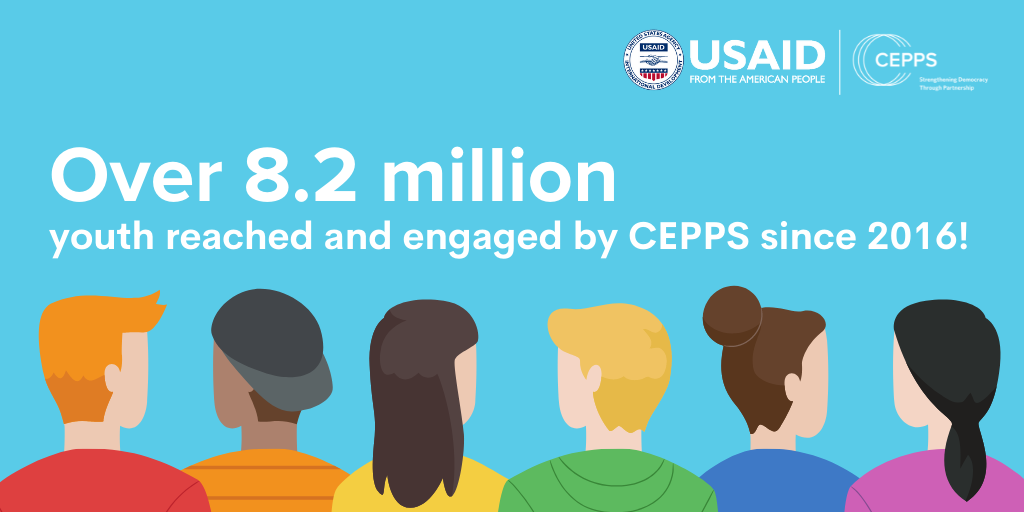To read this issue in its original format, click here.
Dear Colleagues,
In honor of International Youth Day, we are celebrating the important contributions young people make to support inclusive, resilient democracies around the world. This year’s theme is “Intergenerational Solidarity: Creating a World for All Ages”.
Today, 65% of the world’s population is under 35 and 90% of these young people live in developing nations. Engaging people of all ages in political participation and civic life is not only the right thing to do, but is necessary to create stronger, more accountable democracies for all generations.
Young people around the world are restricted or excluded from political participation because of identity-based discrimination. Inequality in all forms, whether based on age, gender identity, sexual orientation, disability, ethnicity, or another aspect of one’s identity, is a threat to democracy. All members of a society need to freely and meaningfully participate in political life to ensure greater responsiveness to citizen needs, more sustainable peace and security, and increased democratic resilience. CEPPS programming works with local youth-led and youth-serving partners around the world to support youth engagement efforts, including strengthening young people’s opportunities for meaningful participation in civic and political life, amplifying the voices and influence of young people, and developing leadership skills.
This past week, CEPPS has been sharing stories and resources that focus on supporting young people’s ability to have their voices heard and participate in decision-making. Check out Twitter and CEPPS.org for more information!
Yours in Democracy,
Jerry Lavery
Managing Director, The Consortium for Elections and Political Process Strengthening
This year’s global theme for International Youth Day, “Intergenerational Solidarity: Creating a World for All Ages”, underscores the urgent need to leverage the full potential of all generations within the democracy and governance field. Solidarity across all generations is key for sustainable, inclusive development. CEPPS is committed to fostering successful and equitable intergenerational relations and partnerships.
 For instance, CEPPS/NDI’s “Speak Youth to Power” campaign champions young people’s political aspirations, advances democratic practices that unite the interests of young people with diverse identities, and strengthens intergenerational political collaboration. Young people around the world are set to inherit an array of complex challenges while their socio-economic opportunities are increasingly limited. They must also contend with entrenched power holders and limited opportunities to access and shape decisions affecting their welfare.
For instance, CEPPS/NDI’s “Speak Youth to Power” campaign champions young people’s political aspirations, advances democratic practices that unite the interests of young people with diverse identities, and strengthens intergenerational political collaboration. Young people around the world are set to inherit an array of complex challenges while their socio-economic opportunities are increasingly limited. They must also contend with entrenched power holders and limited opportunities to access and shape decisions affecting their welfare.
Read more about how the “Speak Youth to Power” campaign is emphasizing the need for young people to translate their power into sustained influence over political decision-making today in order to defend democracy in the future.
Despite constituting more than half of the global population, young people continue to be underrepresented in decision-making processes. Young people everywhere are at a critical juncture as they inherit an array of complex challenges, including environmental degradation, growing social and economic inequality, and decreasing levels of public security. At the same time, their socio-economic opportunities are increasingly limited and they must contend with entrenched leaders who are tightly holding the reins of power. In response, young people find creative ways to express their dissatisfaction with the status quo and demand a more just, equitable, and sustainable future.
Informal political participation is on the rise among youth, and they are increasingly taking action on issues they care about and leading efforts to foster positive change, for example, by taking collective action on issues such as economic inequality, corruption, and gender discrimination. However, the space for youth participation in mainstream decision-making remains limited, and there are limited formal opportunities or resources for young people to take part in programs or design initiatives that engage multiple sectors.
Informed by positive youth development principles, CEPPS is exploring cross-sectoral approaches to address some of the barriers to youth exclusion from decision-making by helping young people understand and address power dynamics and intergenerational relationships in their work. For more information on engaging young people across sectors, check out CEPPS’s Cross-Sectoral Initiative Toolkit, which includes best practices, case studies, and a guidebook.
CEPPS is committed to creating resources and fostering conditions that encourage sustained, meaningful participation and leadership of young people in all aspects of public life. In order to better target DRG programming that is more responsive to the realities of young people’s lives, CEPPS is designing a cross-sectoral barrier analysis tool that will support youth-focused implementers to identify which factors, messages, and strategies will most effectively promote the sustained engagement of young leaders from across sectors in DRG programs. The tool follows the CEPPS Democracy Human Rights and Governance Cross-Sectoral Initiative and will complement its “Engaging Youth Across Sectors” manual and “Social Behavior Change Practitioners Guide”. The barrier analysis tool, driven by strategic input from the Cross-Sectoral Youth Advisory Group, will be piloted by youth-led pilot initiatives. Keep an eye on the CEPPS website where the tool will be released!
Maldives
In May 2022, CEPPS/IFES partner Transparency Maldives held a human rights-themed youth art competition in partnership with the Human Rights Commission of the Maldives. The exhibit provided Maldivian youth a space in which to reflect on areas that they seek to reform as well as a forum put their civic rights to use to advocate for change. Read the full story and view the digital exhibition here.

Brazil
The Women’s Democracy Network country chapter in Brazil (WDN Brazil) has recently completed two training programs titled, “Brazil’s School of Leadership and Political Training of Women” and “Women and Public Policies”. These trainings provide an environment to discuss gender inequality and opportunities for young women, and offers women running for office a chance to develop their technical skills and build leadership capacity. Read the full story on WDN Brazil here.
Ukraine
Since Russia’s full-scale invasion of Ukraine began in February, citizens, public stakeholders and security officials have sought better ways to cooperate across sectors and communities as part of a unified war effort to protect communities and utilize citizen participation in public emergency responses. CEPPS/IRI hosted a Youth Political Leadership Academy Seminar to educate young participants of the importance of cooperation across military and civilian institutions and to provide them with the knowledge and skills necessary to effectively engage with authorities in their own communities. Read the full story on the Youth Political Leadership Academy here.
With 65% of the world’s population under 35 and 90% of the world’s young people living in developing nations, effective youth engagement is critical to implementing DRG initiatives and advancing democracy.
Since 2016, CEPPS has engaged more than 8.2 million youth around the world. This includes over 47,000 people who were reached through youth capacity-building exercises and 78,000 youth events held globally. Find more information here.
